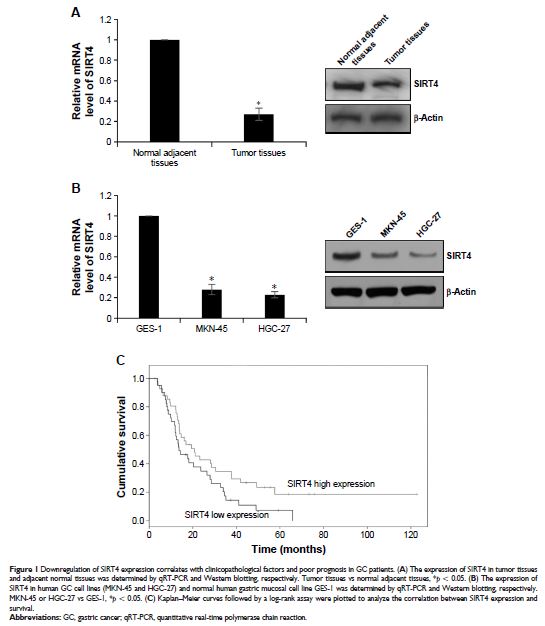108605
论文已发表
注册即可获取德孚的最新动态
IF 收录期刊
- 3.4 Breast Cancer (Dove Med Press)
- 3.2 Clin Epidemiol
- 2.6 Cancer Manag Res
- 2.9 Infect Drug Resist
- 3.7 Clin Interv Aging
- 5.1 Drug Des Dev Ther
- 3.1 Int J Chronic Obstr
- 6.6 Int J Nanomed
- 2.6 Int J Women's Health
- 2.9 Neuropsych Dis Treat
- 2.8 OncoTargets Ther
- 2.0 Patient Prefer Adher
- 2.2 Ther Clin Risk Manag
- 2.5 J Pain Res
- 3.0 Diabet Metab Synd Ob
- 3.2 Psychol Res Behav Ma
- 3.4 Nat Sci Sleep
- 1.8 Pharmgenomics Pers Med
- 2.0 Risk Manag Healthc Policy
- 4.1 J Inflamm Res
- 2.0 Int J Gen Med
- 3.4 J Hepatocell Carcinoma
- 3.0 J Asthma Allergy
- 2.2 Clin Cosmet Investig Dermatol
- 2.4 J Multidiscip Healthc

SIRT4 通过抑制细胞增殖、迁移和侵袭在胃癌中起肿瘤抑制剂的作用
Authors Sun H, Huang D, Liu G, Jian F, Zhu J, Zhang L
Received 5 November 2017
Accepted for publication 23 January 2018
Published 10 July 2018 Volume 2018:11 Pages 3959—3968
DOI https://doi.org/10.2147/OTT.S156143
Checked for plagiarism Yes
Review by Single-blind
Peer reviewers approved by Dr Ashok Kumar Pandurangan
Peer reviewer comments 2
Editor who approved publication: Dr Yao Dai
Background: Previous study has
proven that SIRT4 is downregulated in gastric cancer (GC), but the role of
SIRT4 has not been clearly understood. The aim of our work was to explore in
detail the function and mechanism of SIRT4 in GC.
Methods: A total of 86 pairs of GC tumor tissues and
adjacent normal tissues were collected, and quantitative real-time polymerase
chain reaction and Western blotting analyses were used to determine the
expression of SIRT4.
Results: Our study revealed that the expression of SIRT4 was
downregulated in GC tissues and cells. In addition, the low expression of SIRT4 was
negatively correlated with tumor size, pathological grade, and lymph node
metastasis, which predicted a poor prognosis. Multiple functional experiments,
including Cell Counting Kit-8 assay as well as colony formation assay,
demonstrated SIRT4 suppressed cell proliferation. Moreover, we found
epithelial–mesenchymal transition was regulated by SIRT4, thereby regulating
cell migration and invasion.
Conclusion: Overall, our findings show that SIRT4 serves as
a tumor suppressor in GC and might act as a novel biomarker and a therapeutic
target of GC.
Keywords: sirtuin 4,
proliferation, migration, invasion, epithelial–mesenchymal transition, EMT
